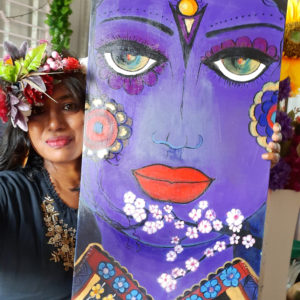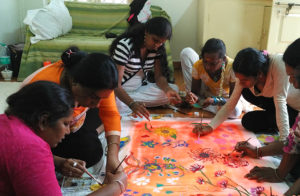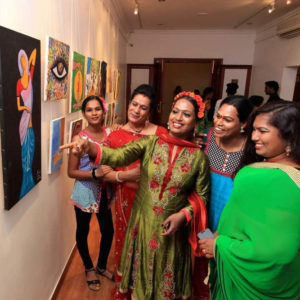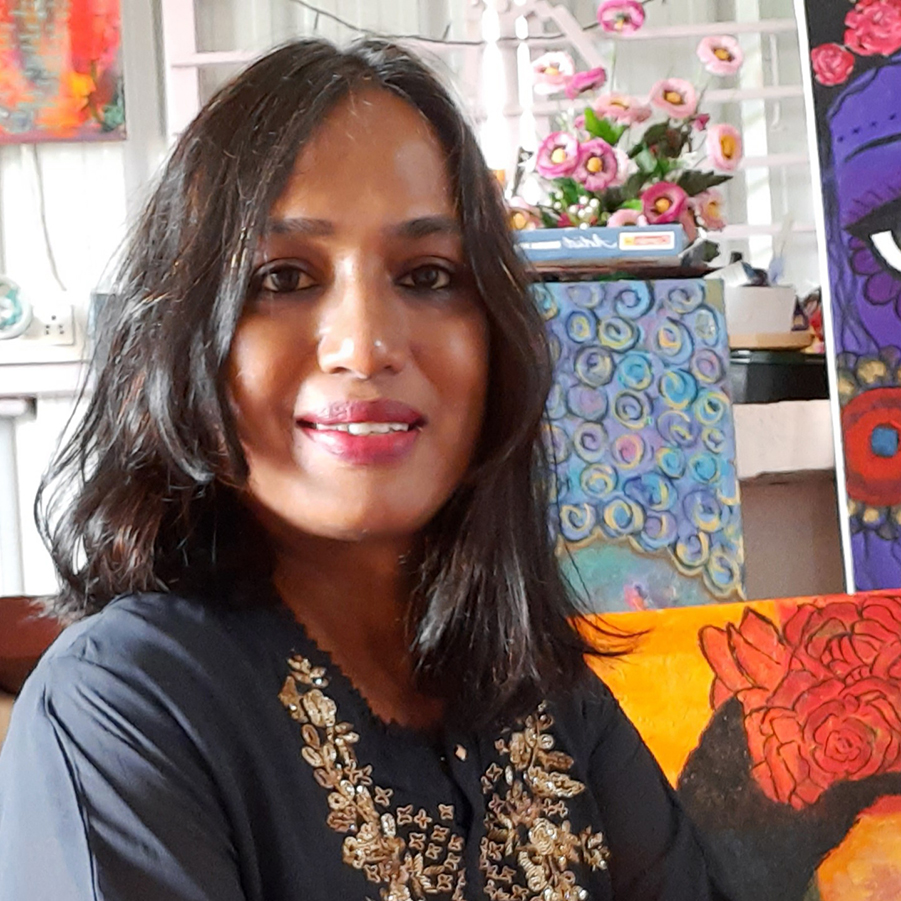 I’m wondering if you can tell me a little bit about what inspired the Sahodari Foundation.
I’m wondering if you can tell me a little bit about what inspired the Sahodari Foundation.
Since childhood, I’ve had difficult experiences because of my transgender identity. I experienced gender-based injustices and gender based-violence at school, at colleges, and in all sorts of public spheres. My trans friends had similar experiences that added mounting pressure over time. They had been mistreated by their own siblings and extended families or were mistreated while at university. I grew up witnessing all that and getting more and more angry. I found ways to let out my feelings by using art and poetry as outlets. I didn’t have many other people with whom I could express myself, my gender, or discuss my gender dysphoria. I always wanted to make a change in the community and, later, in the political sphere, and I decided to found my organization.
Can you tell me about the Sahodari Foundation’s work?
Sahodari is a group of my friends headed and led by me. We intervene where we see there should be justice, awareness, and more work to be done by the media and the government. To address this, we use art, technology, social media, and YouTube as our platforms. In 2009, I attended a media workshop, got a video camera, and trained our community members to use the camera to record their stories and upload them to YouTube. We were some of the first in the country to use social media to upload this type of politicized personal messages.
 What are the most impactful tools that your organization has used?
What are the most impactful tools that your organization has used?
Some of the most effective tools we use are person-to-person accounts, whether in the form of testimonials from our community members, public hearings, or my own speeches. Speaking at universities, colleges, and gatherings of people in person has a significant effect. We’ve also always told these stories through photographs, videos, and art. We want to use these media as ways to share messages of dignity and equality for trans people. We are pioneers in India for using art as well as technology in LGBTI activism, especially transgender activism. Sahodari was one of the very first organizations in India to use social media powerfully in this way and to use art in resistance against gender-based violence.
Can you tell me a bit more about your previous activism regarding the film industry?
When I started my activism, the Indian film industry had specific gender stereotypes. How they portrayed the transgender people was very one-sided, very narrow and very wrong. It was unrealistic. More than that, it was exploitative of how transgender people live, how we function, our culture, our movement. A lot of this unrealistic information was shared as comedy and as entertainment. We raised awareness by speaking about it on TV, on the internet, on Twitter and Facebook, and also by protesting, all in Hindi and Tamil. We made sure that we protested in person as well. We would go to a director’s house, call the media, and hold a protest. We caused many changes in the film industry, and we accumulated a lot of literary figures, writers, and lawyers as allies to our community. They helped us to take the movement forward. Later, when the supreme court of India legally recognized the transgender community, this film industry-related organizing and activism helped us because it had already starting changing cultural understandings of transgender people.
Are there specific campaigns that the trans community in Tamil Nadu has worked on that you are especially proud of?
The activists from Tamil Nadu have been the pioneers in the movement for transgender legal rights. From the local level, to the regional level, and then as a national movement, we’ve been lobbying the supreme court judiciary. At the national level, I was personally involved with advocating to the supreme court judges. I was one of the representatives in addressing the problems and I actually spoke and enlightened the supreme court justice on the problems of the community. I helped file a public interest litigation and won it. Really, the community won it.
 What do you think is the future for the trans community in India?
What do you think is the future for the trans community in India?
The future I see for the trans community in India is the inclusion of trans people and nonbinary people in the family system. That is the priority. The media can do a lot. The judiciary system can recognize our rights. But if we are excluded from our families, it doesn’t mean anything at all. The change comes when you are accepted in your family and you can enjoy everything that your siblings can enjoy. That is what I see as a future not only for Indian transgender people but all over the world.
The second issue is passing acts and laws that protect us from discrimination at school. Protecting our gender nonbinary, gender fluid, and transgender children from being discriminated against, from being victims, and from being subjects of violence, is so important. We need to support policies that protect trans people from workplace discrimination. I’m very optimistic and I believe that it will happen.
People from across India are doing their parts in this movement. Previously, my gurus, my teachers, from the transgender community taught me what I should do, and now I teach what should be done next, and they will teach. The power of love and the power of equality is passed on, you see. That is how Marsha P. Johnson initiated her work: you carry on the torch of light, then another person does it and another person does it. It doesn’t belong to one person, it belongs to an entire community of leaders.
How can people’s donations support the Sahodari Foundation?
Donations and sponsoring supplies helps us. We need a lot of educational books, art supplies, and stationery for the creativity and youth leadership workshops we conduct around India. Also, when we make a work of art that needs to be sold, they can support us by buying our art rather than just donating. We would love to give something to the people who support us.
Money is one thing we need, but even more than that, people can help by donating us opportunities. Invite us to showcase the community’s talent, bring us to seminars, to different events and cultural programs happening in your country. Another way of supporting us is visiting our website, following us on social media, sharing our messages of hope for equality of the transgender and nonbinary community, and the LGBTI community as a whole. Educate people on inclusiveness and acceptance. That doesn’t need money at all. You just need your goodwill, love, and understanding for other human beings. When you have a good heart, you can do a lot.
To learn more about supporting the Sahodari Foundation, please visit: https://sahodari.org/donate/
Follow Kalki on social media: https://www.instagram.com/queenkalki/

